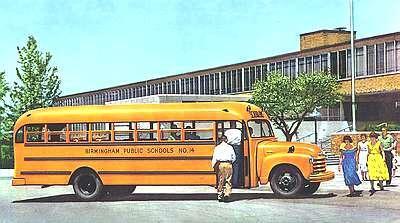 I spent a great deal of my young life on a school bus when I began my grade school career in 1955. My brothers and I were the first on in the morning and the last off in the afternoon—you see, we lived on the continental divide between Bremen and Sugar Grove.
I spent a great deal of my young life on a school bus when I began my grade school career in 1955. My brothers and I were the first on in the morning and the last off in the afternoon—you see, we lived on the continental divide between Bremen and Sugar Grove.
Interestingly, the school buses from these two villages arrived at their common turn-around point at the same time each morning. The drivers would face off with one another like gunfighters, only to smile and defer to the other. It was an exciting event for a first grader—boarding lights blinking, the waiting driver bravely holding back the tinkle of traffic, their counterpart backing into the neighbor’s driveway like draft horses backing into their harness. I eagerly boarded each morning and sat directly behind the driver, anticipating the morning bus ballet as they corrected their course and lumbered off to their respective institutions, bright yellow bodies swaying to the rhythm of clamoring students.
I was blessed to be on the Berne Union side of the equation, in which all twelve grades attended the same school under the same roof. Regardless of age, everyone rode the same bus—from first graders to seniors. In fact, I rode the same bus with the same driver my entire school career. Mr. William Fisher piloted Bus Number Four. Bill (as he insisted we call him) was more grandfather than public servant. His gentle nature and kind smile had me convinced he was secretly happy I rode his bus. Each morning he would tap the horn twice and wave as he passed his own home near Horns Mill. I felt like part of his family then, and today I still recall his children’s names.
Like most Americans during that time, our family operated on a very austere budget; we had what was needed but never more. The truth is, we didn’t “accumulate” stuff like we do today. We weren’t materially saturated and consumerism had yet to overtake our society. As a result, small things that are today considered insignificant meant a great deal to us youngsters.
Let me give you an example: On the last school day before Christmas break, Mr. Fisher always had two large cardboard boxes on the floor next to the drivers’ seat. One was carefully stacked with brown lunch bags folded neatly at the top, containing a candy bar and a candy cane for each passenger. The other large box, colorfully stenciled, “Fresh Florida Oranges Supporting Your Athletic Boosters!”, was mounded high with sweet smelling produce. Mr. Fisher greeted each of us as we clamored on and off his bus each day, but on this day as he arrived at each home he deliberately shifted the bus into neutral, sternly yanked on the emergency brake, turned in his seat and handed each of us our gift bag as he exclaimed, “Merry Christmas! Take a couple oranges, they’re good for you!”
It was incredible how a simple brown bag containing a few humble treats swelled my heart with appreciation. I’m a little embarrassed to admit to you, good people, that even today that memory continues to touch something deep within me. Also etched in stone in my memory is Mom, without fail reminding her sons, “You boys make sure you thank Mr. Fisher—he paid for these out of his own pocket and the goodness of his heart.” Message received, Mom!
In everything give thanks: for this is the will of God in Christ Jesus concerning you.
1 Thessalonians 5:18 KJV
I’d like to be better at walking in that kind of appreciation every day. I wish I didn’t require nostalgia to lubricate my gratitude. Do you know what I mean? I wish I could walk in the same humble naivety today as I did then, viewing every small kindness more keenly and more kind to others myself. It’s hard not to let my best grown-up intentions get pushed to the back of the bus.
